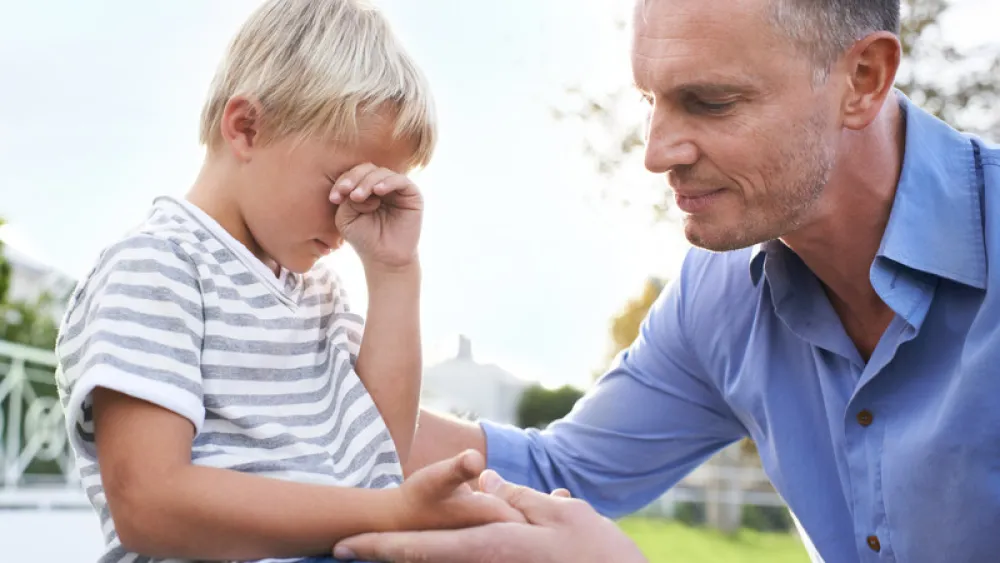




Family Health
Helping a Child Handle Grief


Grief in childhood
The loss of a friend, a sibling or a parent in childhood can be very difficult for everyone involved. In childhood, grief can manifest differently depending on the child’s developmental level.
- A preschooler may demonstrate regressive behaviors (baby talk or decreased verbalization) and increased anxiety.
- An elementary aged child may demonstrate decreased academic performance, attention/concentration difficulties, irritability or aggression, sleep disturbance or appetite disturbance (eating more or less than normal), guilt, anxiety and repeated telling of the event.
- A middle school or high school youth may show decreased academic performance, attention or concentration difficulties, engagement in high risk behaviors such as substance abuse, difficulties with peers, nightmares, flashbacks or depression.
Grief with chronic illness
In the case of a chronic illness, a child may witness the deterioration and ultimate death of a loved one. This is called anticipatory grief, and it can come in four phases:
- Depression
- Extreme concern for the dying person
- Preparing for the death
- Adjusting to the changes caused by the death
There can be different methods to help a child through these stages:
Narrative Therapy
In narrative therapy, you help the child tell their own story about their experiences. The child then considers two choices to end a story and have them choose the one that represents an adaptive way to deal with her or her feelings.
Play Therapy
If the child is unable to tell a story, you can use play therapy, using stuffed animal to personify people and feelings.
Bibliotherapy
Bibliotherapy is reading a book that deals with life and the end of life. Charlotte’s Web by E.B. White and The Last Lecture by Randy Pausch are both books that can help to engage a child in a discussion about anticipatory grief.
When death comes suddenly
Not all death is anticipated. Sudden loss of a loved one can be very difficult as well.
There are four phases of grief associated with sudden loss:
- Shock and numbness (stunned, difficulty thinking clearly)
- Yearning and searching (restless, angry, guilty, bewildered)
- Disorientation and disorganization
- Reorganization and resolution (acceptance)
Looking to community resources for specialized support groups that include others dealing with similar loss can be helpful.
No matter whether the loss is sudden or anticipated, the most important thing you can do is listen. Be available to listen to your child.
Final arrangements
 You can also help your child grieve by giving them a voice. Would they like to be involved with the funeral service? What role would they like to play? A child who is frightened about attending a funeral should not be forced to go. Children should be allowed to express their feelings about loss and grief in their own way.
You can also help your child grieve by giving them a voice. Would they like to be involved with the funeral service? What role would they like to play? A child who is frightened about attending a funeral should not be forced to go. Children should be allowed to express their feelings about loss and grief in their own way.
There are many ways to honor a loved one without attending the funeral:
- Lighting a candle
- Saying a prayer
- Making a scrapbook
- Reviewing photographs
- Telling stories
Loss of a pet
Whether a goldfish, a pet frog or a dog a child has known his whole life, the death of a pet can be very difficult as well.
Tell your child (no matter the age) about the death and then take a minute. Ask the child what he thinks death means before moving on. Children often need a small amount of information initially. They process the information and then come back later to ask questions.
Express your own grief and reassure the child that many different feelings are okay. A child may feel sad, angry or guilty. Allow your child to express his feelings verbally or through crayons and drawing.
Avoid euphemisms.
Kids are literal. If you say that Rover went to sleep, your child may fear bedtime.
Be honest.
Hiding a death from a child can cause increased anxiety and anger. Children are capable of understanding that life must end for all living things. Support their grief and acknowledge their feelings.
When grief becomes more
There are many signs your child may be having serious problems with grief:
- An extended period of depression in which a child loses interest in daily activities
- Inability to sleep, loss of appetite, or a prolonged fear of being alone
- Acting much younger, or showing developmental regression for an extended period of time
- Repeated statements of wanting to join the dead person
- Withdrawal from friends
- A sharp drop in academic performance or refusal to attend school
All are signs to discuss with a pediatrician to get additional help with the grieving process.
Talk with your child and let your child know that you are available to listen to his/her feelings. If you feel that your child is having a difficult time with grief, talk to your Methodist Physicians Clinic pediatrician about different community resources or counselors that may be available.


